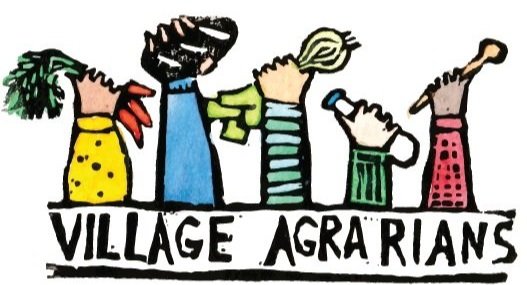The Setha’s Seeds Team: Roddy, River Rose, Setha & Kiersten-Anna in their early spring garden!
The Setha’s Seeds team: Setha, Roddy, River Rose & Kiersten-Anna, live in the Hawkes Bay, near Tutira, in a bursting garden of all sorts of flowers and fruiting plants.
Setha and Roddy have been growing seeds and selling as Setha’s Seeds since 2013 in the long, hot summers that the Hawke’s Bay offers. They are well known for their beautiful yams, heritage potatoes and garlic, and over the years have gathered and propagated some real Aotearoa seed treasures.
You can find Setha’s Seeds on their website and in some great wee organic stores and grocers across the country. See where you can find Setha’s Seeds near you on our directory!
You can read more about Setha’s Seeds in a recently released book by Sophie Merkens: Grow/Wahine Finding Connection Through Food, and in a 2019 NZ Gardener article.
Setha’s Seeds has offered all of our Village Agrarians members a 5% discount off one seed order above $30. Setha has also shared with us a little about why they do what they do and a recipe for Kale Salad.
Thank you Setha’s Seeds!
How is Setha's Seeds different from other big brand seeds companies folks run into in large chain stores?
Our point of difference is that we grow all of our seeds offered on our website. This is an important distinction from our collection to other seed companies who often purchase in most of their seeds from the multinational seed market, which are grown overseas in climates very different from ours. All of our NZ heritage seeds, which are most of the seeds in our range, came to New Zealand with the early settlers arriving on boats and waka to start their new lives in a foreign land. Some came sown into hems of women’s skirts or in their trunks or suitcases. After all these years they have been kept alive by the gardeners of New Zealand. They are very well suited to this climate by now and you can now keep them alive in your garden for your children’s children to enjoy one day. We also have some open pollinated varieties that we have decided to include here because we like them so much. These varieties are not NZ heritage but we have been growing them for some time and find them to be important parts of our collection and wanted to make them available. All of our seeds will produce true to type and therefore the seeds can be saved.
What's your current favourite seed/plant/fruit/vegetable/flower etc to grow?
What a hard question! I have so many favourites it is hard to pick just one. This winter I fell in love with our Chinese Cabbage Chi Hi Li! It is such a delicious winter vegetable, very prolific, and even tasty when starting to go to seed! The stalks are delicious and sweet, never woody and the leaves offer great additions to stir-fries and ferments.
As for a flower, our Strawflower Swiss Giants, is becoming a favourite. They are so beautiful to behold, make great bouquet flowers as well as flowers to use in craft projects or dried arrangements. Kids seem to really love them for their vibrant colours for free play and making creations.
What do you like most about producing seeds?
Knowing where our seed and therefore food comes from and having confidence that we are helping our family and many other NZ families develop food security.
Do you have offerings besides seeds that you want to share?
We have some live plant material like strawberry runners, seed potatoes, yams, seed garlic and multiplying onions available seasonally throughout the year. We also offer educational workshops at Setha’s Seeds as well as at other locations from time to time. We have created several booklets with important information about seed propagation and harvesting which are also available on our website. And our gift vouchers make great gifts for your gardening friends and family!
(If you are interested in purchasing any strawberries, potatoes, yams, garlic, or multiplying onions from Setha’s Seeds, we recommend signing up for their newsletter as they sell out quickly and you will want to know when they become available! You can sign up to the newsletter on their website)
Setha’s Kale Salad
Method:
Combine the kale, onions, and petals
Add the dressing and toss – let sit for 20 min.
Just prior to serving toss in the toasted seeds and leave some for garnish on top 😊
Ingredients:
1 bunch finely chopped kale (I often use Red Russian; we sell the seed 😉)
A few Spring Onions chopped or red onion thinly sliced
Calendula flower petals
Toasted seeds (I use sesame and sunflower)
Dressing – 1/3 each of Olive Oil, Tamari (soy sauce), Cider Vinegar or Lemon juice.













